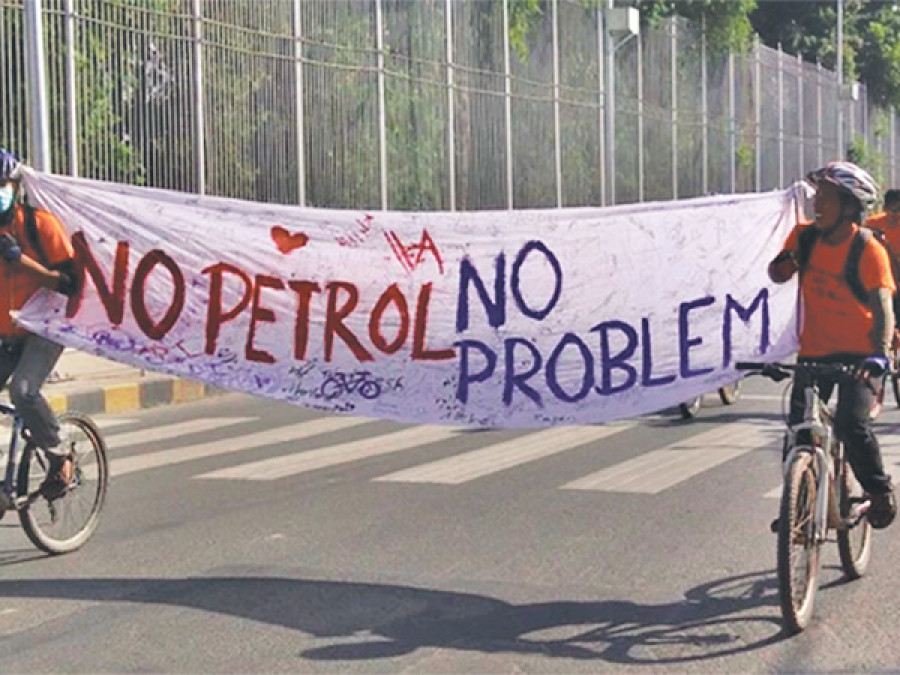Opinion
Art of survival
I thank Narendra Modi for providing Nepal an opportunity to rethink its future
Motikala Subba Dewan
The humanitarian crisis in Nepal resulting from the devastating quake that took place about six months ago is not yet over. Many people continue to reside in temporary shelters, and are still in need of relief materials. Making matters worse during this period of national crisis, another problem emerged with the promulgation of the country’s new constitution. The Madhesi people commenced their protests against the statute and continue to obstruct the border. They blame the government for failing to include their aspirations in the new constitution. Now, it has been almost three months since the Madhesi
parties started their protest and over a month since the fuel crisis began resulting in an acute shortage of essential medicines, cooking gas and daily supplies. This has greatly hampered the livelihoods of the entire population.
Sharing information
The government and Madhesi leaders need to make a joint effort to resolve their problems by respecting one another’s position. Party leaders have to reach out to Madhesi leaders and the people and provide them correct information about the newly promulgated constitution. Recently, CPN-UML leader Madhav Kumar Nepal went to Rautahat, and addressed the locals and explained the provisions of the new constitution urging them to go through the text before protesting against it.
Regarding the issue of citizenship, any person with naturalised citizenship after relinquishing the citizenship of another country cannot be allowed to become the head of government. The world over, a sovereign country and its people seldom allow a foreigner to rule their country. A close example of such a case is the protest in 2004 by Sushma Swaraj, an Indian leader of the Bharatiya Janata Party, that Sonia Gandhi should not be allowed to become the prime minister of India due to her foreign origin. Swaraj vowed to shave off her hair if Gandhi became the head of government.
Nepal’s leaders have been stating that the issue of citizenship led to the border closure with India’s backing. And by now, it has become apparent that the protestors are being supported by India, whether the Indian government accepts it or not. Indian Minister for External Affairs Sushma Swaraj stated at the 70th UN General Assembly in New York that India had never dictated anything to Nepal, adding that the decision-making power lay solely with Nepali leaders. India supported Nepal in the aftermath of the earthquake without debating whether it was Nepal’s internal matter or not. But why is India not taking the initiative to resolve the so-called blockade by the Madhesi Morcha and leaving its neighbouring country to suffer in such a state of crisis? Swaraj even denied that India had imposed a blockade on Nepal. If it were so, why is the Indian Oil Corporation (IOC) reluctant to supply fuel although there is no blockade at the Jogbani border?
International indifference
According to World Trade Organisation laws, the signatories, which include India and Nepal, are entitled to the right to trade with each other. The transit treaty between Nepal and India is still in force, but the undeclared blockade persists. Nepal has also signed a Bilateral Trade Treaty with India which grants access to the sea, but this has been violated. Under modern international laws, only the Security Council can declare a blockade by invoking Chapter VII of the UN Charter. If there is a threat or breach of peace or an act of aggression, it alone can decide to impose a blockade. The Nepali people are fighting for day-to-day survival facing severe human rights violations. The blockade has crippled businesses, schools and hospitals besides severely stunting economic growth and Nepal’s development. Yet, why and how can the international community stay silent while Nepal is suffering so?
We shall survive
The dependency on India and lack of adequate road links to the north has proven to be a major disadvantage for Nepal. The blockade has forced Nepal to explore alternatives and taught the country not to depend on its closest neighbour alone. As the Nepal Oil Corporation has recently inked an agreement with PetroChina, a Chinese oil company, it could ease the shortage petroleum products in the coming days. The Nepal government should also seriously think sustainable trade options.The new government under Prime Minister KP Oli should take immediate steps to bring the agitating groups to dialogue and resolve their problems. If this blockade continues for long, it will lose its effectiveness. Nepali people will learn to survive and adapt, as we always have, whether the border is open or not. We are a country of great endurance, and it will continue to remain a proud sovereign and independent country. India, however, risks losing Nepal’s faith
and trust.
If the intention of the blockade is to showcase the superiority of one country over another and weaken the indomitable spirit of the Nepali people, it has failed miserably. On that account, I would like to thank the Indian Prime Minister Narendra Modi for providing Nepal an opportunity to rethink its future. If the blockade persists, we are ready to prepare alternatives to everything. As Isaac Asimov has written in his essay entitled The Nightmare Life Without Fuel, “If there is no fuel in the future… the air is cleaner... legs are king in the cities.” Most importantly, life will not stop. We will adapt, and we will rise.
Subba Dewan is Associate professor of English at Tribhuvan University




 17.9°C Kathmandu
17.9°C Kathmandu











